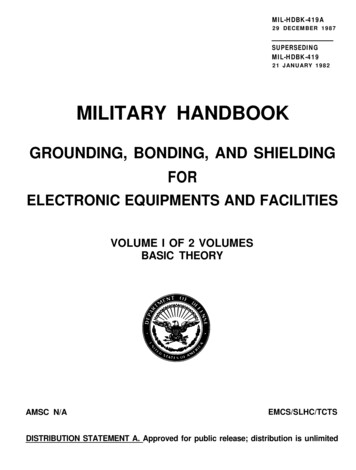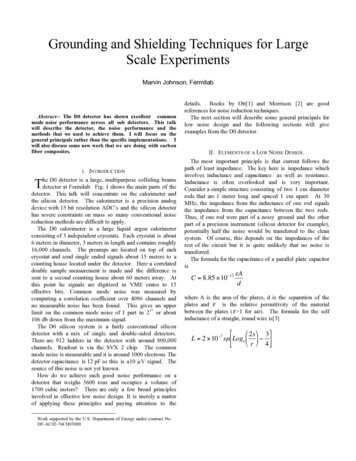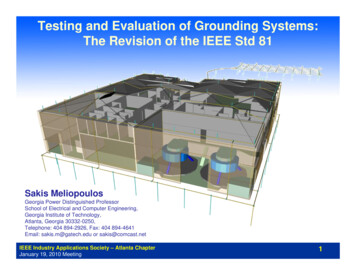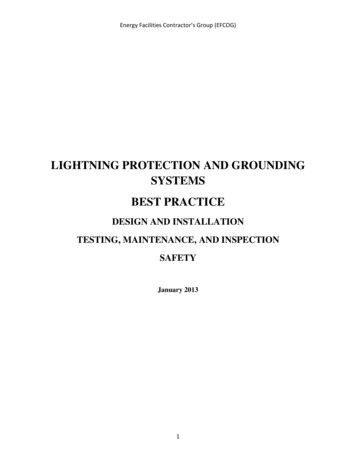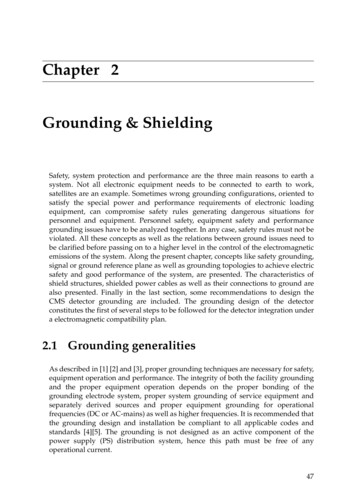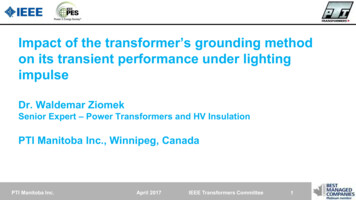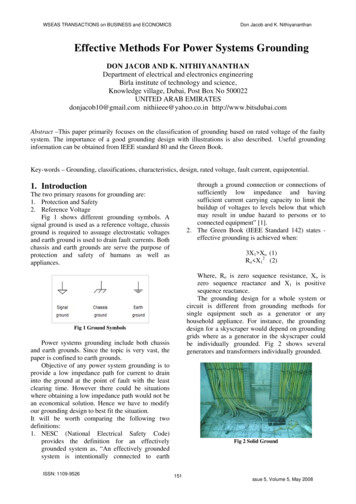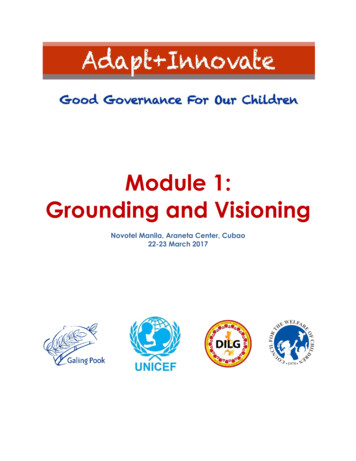
Transcription
Module 1:Grounding and VisioningNovotel Manila, Araneta Center, Cubao22-23 March 2017
22-23 March 2017[MODULE 1: GROUNDING AND VISIONING]Table of ContentsExecutive SummaryWorkshop ConceptWorkshop ObjectiveWorkshop Format3445Welcome AddressSolidarity MessageDepartment of the Interior and Local GovernmentCouncil for the Welfare of ChildrenUnited Nations Children’s FundSigning of the Pledge of CommitmentExpectation SettingSession 1: My Leadership JourneySession 2: Looking at the Current State of ChildrenMandates for Child Friendly Local GovernanceCFLGA Results for the 12 Participating LGUsSession 3: LGU Innovations Challenge: Towards Improving the State of OurChildrenSession 4:The Ways Forward: Re-entry PlanningClosing ProgramWorkshop Evaluation6Annex 1. Module 1: Grounding and Visioning ProgramAnnex 2. Planning Workshop ParticipantsAnnex 3. Presentation on the Mandates for CFLGAnnex 4. Presentation CFLGA Results for the 12 Participating LGUsAnnex 5. Photo Gallery2 Galing Pook Foundation67781010131415171935363738425776
22-23 March 2017[MODULE 1: GROUNDING AND VISIONING]Executive SummaryThe Galing Pook Foundation (GPF) with support from the United Nations Children’s Fund(UNICEF), the Department of the Interior and Local Government (DILG) and the Council forthe Welfare of Children (CWC) organized the Module 1: Grounding and Visioning PlanningWorkshop under the Adapt Innovate for Children initiative. Participants includedrepresentatives from eleven pilot local government units (LGUs) and aforementionedpartners.Ms. Marides Fernando, GPF Chairperson, introduced the Capacity Building Package (CBP)under the Adapt Innovate for Children initiative aimed at mainstreaming the rights of thechild in the core development agenda of the LGU. In their Messages, DILG Dir. LeocadioTrovela, Ms. André Canilang of CWC, and UNICEF Country Representative Lotta Sylwanderhighlighted the critical role of the LGUs in the promotion and protection of the rights of thechild.Session 1 on the Leadership Lifeline emphasized the link between leadership anchored on[learned] values, motivations, feelings, memories and personal experience and how theseshape the responses for issues and concerns related to children. Through group sharing,participants were able to identify common experiences in their lives as well as the sameconcerns for children in their respective localities.Having appreciated that, the 2nd session on the Current State of Children discussed theperformance of participating LGUs based on the Child Friendly Local Governance Audit(CFLGA). This reiterated the common concerns for children among the LGUs which includemalnutrition, [low] day care participation, and prevalence of children victims of abuse,neglect, and exploitation.To give the participants a better idea of possible programs for implementation, the 3rdsession on LGU Innovations Challenge Towards Improving the State of our Childrenfeatured three Galing Pook LGUs. Said LGUs implemented simple but innovative programsto address concerns on literacy and nutrition with crosscutting interventions that have farreaching positive results.For the 4th session on Re-entry Planning, the participating LGUs were able to come up withtheir respective innovative programs based on their CFLGA performance and identifiedneeds for children. More specifically, programs were designed to address malnutrition,teenage pregnancies, violence against children, low day care participation, and literacy.3 Galing Pook Foundation
22-23 March 2017[MODULE 1: GROUNDING AND VISIONING]Workshop ConceptThe Galing Pook Foundation (GPF) in partnership with the United Nations Children’s Fund(UNICEF), the Department of the Interior and Local Government (DILG) and the Council forthe Welfare of Children (CWC) is implementing a Capacity Building Package (CBP) withfocus on children under the Adapt Innovate for Children initiative. This is aimed atmainstreaming child rights in the core development agenda (CDA) of local governmentunits (LGUs). The results of this initiative will be used by the DILG to improve delivery oftechnical assistance to other LGUs as well as to promote the replication of good practicesand innovations on child-rights practices and programs.Utilizing the result of the 2015 Child Friendly Local Governance Audit (CFLGA), lowperforming LGUs along with UNICEF Convergence areas were invited to the 2016Governance Fair with the theme Good Governance for Children which showcased LGU goodpractices and innovations which have resulted in good outcomes for children. TheGovernance Fair, which is Module 2 of the CBP, served as the pre-selection activity of pilotareas for the initiative. The Galing Pook will work with said LGUs to demonstrate a processof planning and budgeting using the CFLGA indicators and child outcome indicators asbenchmarks and targets.Module 1: Grounding and Visioning is one of the four modules under the GPF-UNICEF-DILGCBP. This is to be followed by Module 3, Adaptive Leadership. In between the modules, theGaling Pook will be providing out-of-town learning experiences and mentoring servicesthrough phone and on-line consultations as well as field visits.Workshop ObjectivesAt the end of the 2-day planning workshop, the tri-leaders are able to:1. Get acquainted with the program partners and level off expectations2. Discern personal purpose and leadership capital3. Look into the state of children particularly in their localities, vis-à-vis, the Childfriendly Local Governance Indicators4. Generate ideas and plan to improve the state of children5. Identify training/mentorship needs6. Plan for the field and mentoring activities7. Sign a social contract/letter of commitment4 Galing Pook Foundation
22-23 March 2017[MODULE 1: GROUNDING AND VISIONING]Workshop FormatThe Module 1: Grounding and Visioning is a two‐day Planning Workshop held on 22-23March 2017. This involved 46 representatives from 11 local government units (LGUs),specifically, the Municipalities of Labo and Paracale in Camarines Norte, Sulat in EasternSamar, Malungon in Sarangani, Aleosan, Arakan and Midsayap in Cotabato, South Upi inMaguindanao, Kalamansig in Sultan Kudarat and the Cities of Lamitan in Basilan andZamboanga. Representatives included 9 Mayors and 1 Councilor with respective staff fromthe local health, education, and social welfare and development departments. Along withthe representatives are 5 five facilitators and observers as well as 10 members of theSecretariat.On the first day, 4 Guest Speakers from Galing Pook, the DILG, CWC, and UNICEF deliveredthe Welcome Address and respective Solidarity Messages. On the second day, 2 ResourcePersons from the DILG and CWC discussed Session 2: Looking at the Current State ofChildren.The Planning Workshop involved four sessions which started with the Leadership Journeywhere participants articulated on their respective formative childhood experiences andidentified issues and concerns related to children. This was followed by Sessions 2 and 3with focus on the current state of children and improving said state, respectively. ForSession 4, the LGUs drafted and presented their respective Innovative Programs based onthe inputs from the 2nd and 3rd sessions.5 Galing Pook Foundation
22-23 March 2017[MODULE 1: GROUNDING AND VISIONING]Welcome AddressMs. Marides Fernando, Chairperson of the Galing PookFoundation (GPF), introduced the Capacity Building Programfor local government units (LGUs) entitled “Adapt Innovatefor Children” in collaboration with the United NationsChildren’s Fund (UNICEF), the Department of the Interior andLocal Government (DILG), and the Council for the Welfare ofChildren (CWC). Under the program, the select LGUs will beprovided with support through workshops, learningexchanges and mentoring towards mainstreaming child rightsinto their respective Core Development Agenda.The Program, anchored on child-friendly local governance forthe protection of children, will make use of the Child FriendlyLocal Governance Audit (CFLGA) and child outcomeindicators as benchmarks and targets. Ms. Fernando thenenjoined the participants to take the 2-day PlanningWorkshop as an opportunity to learn whilst also enjoying the Ms. Marides Fernando, GPF Chairperson,company of other LGUs.welcomes the participantsSolidarity MessageDepartment of the Interior and Local GovernmentDirector Leocadio Trovela of the DILG-National Barangay Operations Office (DILG-NBOO)congratulated and at the same time wished the selected LGUs good luck as being part of theAdapt Innovate for Children Program will serve as a challenge for the LGUs to improve onor upscale their initiatives on child friendly local governance.Briefly recalling the beginning of the CLFGA, Dir. Trovelamentioned that the CFLGA is a pioneering effort as one of thefew audits made mandatory in the country. He thankedUNICEF for pushing and lobbying the concept of a childfriendly audit to the national government. He stated, andhoped, that the engagement with Galing Pook to link the audit[results] to LGU planning and investment will bemainstreamed to other LGUs considering the difficulty ofputting children in the local priority agenda.Finally, Dir. Trovela shared the current administration’sdirective towards child friendly initiatives which led to theDepartment’s Memorandum Circular acknowledging the vitalrole of the Local Chief Executives (LCEs) as chair of the LocalCouncils for the Protection of Children (LCPCs) and the role ofall barangay officials as the custodians of children’s rights.6 Galing Pook FoundationDir. Leocadio Trovela, DILG
22-23 March 2017[MODULE 1: GROUNDING AND VISIONING]Council for the Welfare of ChildrenMs. André Canilang delivered the Council’s Message in lieu ofExecutive Director Patricia Luna. She mentioned that theCFLGA and the conferment of the Seal of Child Friendly LocalGovernance (SCFLG) are strategies developed towards theachievement of a “Child Friendly Philippines”. She then cited anincreasing trend in the number of cities and municipalitiesdeclared eligible for the SCFLG, specifically from 934 [of 1,366audited] in 2014, to 1,093 [of 1,439] in 2015 and finally, 1,176[of 1501] in 2016.Emphasis was given on the pivotal role of LGUs, along with theprovision of technical assistance from the nationalgovernment, in achieving the targets for children. It was hopedthat the Grounding and Visioning Planning Workshop willMs. André Canilang, CWCfurther capacitate LGUs in providing the needs of children intheir respective communities. As a final note, Ms. Canilang quoted Nelson Mandela instating that “Safety and security don’t just happen, they are the result of collective consensusand public investment. We owe our children, the most vulnerable citizens in our society, a lifefree of violence and fear”.United Nations Children’s FundMs. Lotta Sylwander, Country Representative, shared that the CFLGA has been the advocacyof UNICEF in promoting good governance for children which includes knowing andunderstanding who are the children, where they live, what are their concerns and interestand how concerned stakeholders make the choices on where/who to focus. Sheemphasized the importance evidence-based decision-making to ensure it impacts thoseneeding the most assistance.The following lists the issues concerning Filipinochildren shared by Ms. Sylwander:- Stunting of at least 40% of children which affectstheir overall development. Moreover, 45% of stuntedchildren are in Mindanao.- The number of out-of-school youth, recorded at1.2 million, but may be as high as 3-4 million if childrenof indigenous peoples (IPs) and children withdisabilities (CWDs) are included.- Four out of six children experience violence –physical, psychological and sexual - which is higher thanthe global figures.- High child poverty incidence and disparities forIPs and CWDs.Ms. Lotta Sylwander,UNICEF Country Representative7 Galing Pook Foundation
22-23 March 2017[MODULE 1: GROUNDING AND VISIONING]Ms. Sylwander emphasized that [understanding of] decentralization is the key to moreequitable distribution going as far as saying that not having inequalities in mind, one[LGU/agency] may not actually succeed. She then summarized her message into two points.One, for the LGUs to return to their respective localities with learning/s they may use andtwo, to ask for help – to bridge the gap and close the gap.Finally, Ms. Sylwander concluded with a quote from Nelson Mandela “There can be nokeener revelation of a society’s soul than the way in which it treats its children”.Signing of the Pledge of CommitmentLed by Honorable Virginia Zacate, LCE of the Municipality of Sulat, the participants, guestspeakers, facilitator andmembers of the Secretariatrecited the Pledge of GoodGovernance for our Children(please refer to the followingFigure). This was followed bythe ceremonial signing of thePledge by Ms. Sylwander, Ms.Fernando, Dir. Trovela, Ms.Canilang, and the LCEs of theparticipating LGUs.Guest Speakers and Participants Pledgingtheir Commitment for Children8 Galing Pook Foundation
22-23 March 2017[MODULE 1: GROUNDING AND VISIONING]Pledge of Good Governance for our Children Signed by Guest Speakers and LCEs9 Galing Pook Foundation
22-23 March 2017[MODULE 1: GROUNDING AND VISIONING]Expectations SettingFacilitated by Ms. Li-Ann de Leon, the participants shared their expectations for thefollowing:1. Program Adapt Innovate for Childrena. To get acquainted with the program’s purposeb. Innovative ideas on governance and programs for children that may beadopted/replicatedc. To gain more knowledge [best practices from other LGUs] towardsimproving children’s livesd. Establish linkage and mobilize support/resources for children2. Module 1 Planning Workshopa. Craft clear vision and mission to uplift children’s livesb. Formulate [doable] plans for childrenc. Increased capacity in planning process for children’s programsd. Simple, relevant, hands-on activity/ies3. Facilitatorsa. Appr
Galing Pook will be providing out-of-town learning experiences and mentoring services through phone and on-line consultations as well as field visits. Workshop Objectives At the end of the 2-day planning workshop, the tri-leaders are able to: 1. Get acquainted with the program partners and level off expectations 2. Discern personal purpose and leadership capital 3. Look into the state of .

